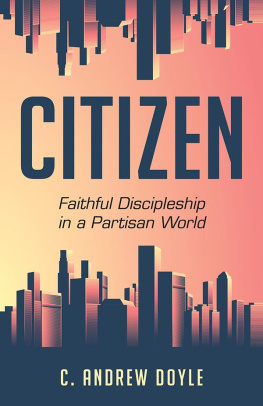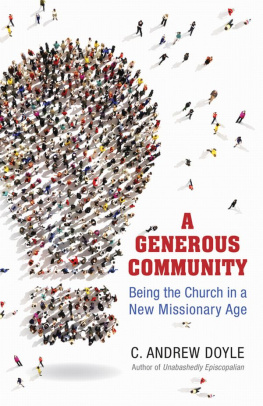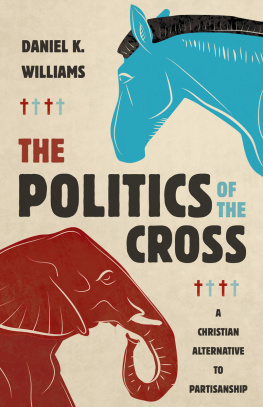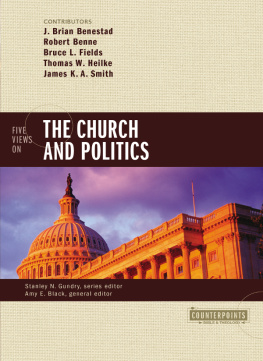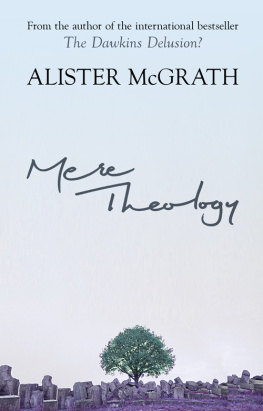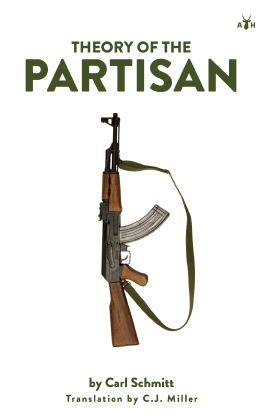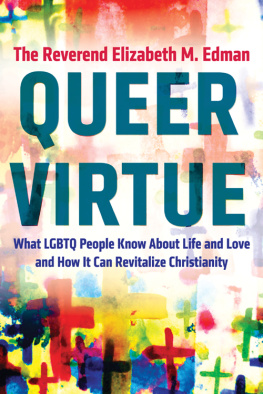CITIZEN
CITIZEN
Faithful Discipleship
in a Partisan World
C. ANDREW DOYLE
Foreword by Cynthia Briggs Kittredge

Copyright 2020 by C. Andrew Doyle
All rights reserved. No part of this book may be reproduced, stored in a retrieval system, or transmitted in any form or by any means, electronic or mechanical, including photocopying, recording, or otherwise, without the written permission of the publisher.
Unless otherwise noted, the Scripture quotations are from New Revised Standard Version Bible, copyright 1989 National Council of the Churches of Christ in the United States of America. Used by permission. All rights reserved worldwide.
Church Publishing
19 East 34th Street
New York, NY 10016
www.churchpublishing.org
Cover design by Paul Soupiset
Typeset by PerfecType, Nashville, Tennessee
Library of Congress Cataloging-in-Publication Data
Names: Doyle, C. Andrew, author.
Title: Citizen : faithful discipleship in a partisan world / C. Andrew Doyle ; forward by Cynthia Briggs Kittredge.
Identifiers: LCCN 2019039850 (print) | LCCN 2019039851 (ebook) | ISBN 9781640652019 (paperback) | ISBN 9781640652026 (ebook)
Subjects: LCSH: Christianity and politics. | Christians--Political activity. | Citizenship--Religious aspects--Christianity.
Classification: LCC BR115.P7 D67 2020 (print) | LCC BR115.P7 (ebook) | DDC 261.7--dc23
LC record available at https://lccn.loc.gov/2019039850
LC ebook record available at https://lccn.loc.gov/2019039851
The tyranny of a prince in an oligarchy is not so dangerous to the public welfare as the apathy of a citizen in a democracy.
Charles de Montesquieu, French philosopher and judge
W hen good, polite, and well-meaning people of faith, in a sincere effort to get along, avoid the subjects of politics and religion, they abdicate both their civic and their religious responsibility, and they leave the conversation to those who will exploit division. The incisive diagnosis, the call to shared values, and the word of hope offered by the Christian gospel are silent, and the country and the world grow more fractured and more severely damaged. Realizing Gods dream for human flourishing recedes, and the church of Christ is weakened.
Those who are commanded to love God and to love neighbor and to be a community to heal the world cannot escape the responsibility of politics. In the chapters that follow, C. Andrew Doyle exhorts Christians to fulfill their vocation as Christian citizens. His passion for this task arises from his theological commitments that have been shaped and sharpened by his particular experience as pastor, preacher, and church leader. Doyles pastoral identity energizes his projecthe has witnessed congregations, anxious about changes in society and the church, paralyzed by apathy or swept up into partisan wrangling. He has listened to their conversations about the separation of church and state and heard echoes of the identification of America with Christianity. To this corporate wrestling, Doyle, the pastor, brings compassion and moral direction. As a preacher, Doyle interprets and proclaims Holy Scripture as it addresses human suffering within a damaged and diminished world community. He brings the vision-creating, rousing music of biblical voices to give hope and awaken communal action. Andrew Doyle is an ordained leader in the church, a bishop, called to a specific ecclesiastical role of oversight, unity, and teaching. He exercises this historic traditional role in the new circumstances that are this moment. As many readers of this book will be, Doyle is also an American nurtured in the culture of patriotism and pride that intersects and interacts with Christianity in this country. He embodies the tensions within many people of faith.
Bishop Doyle is a reader, and he engages the gospel with a wide range of contemporary writers. In dialogue with thinkers in ethics and theology, history, and political science, Doyle draws on the resources of the Christian tradition to offer a model for congregations to engage in politics as Christian citizens. Characterized by conviviality and openness to the voices of others, the model invites people of faith to enter the conversation as Christians first and Americans second. Describing the complex interaction of principles and philosophies in the founding of American democracy and acknowledging the ambiguous history of call and conquest, Doyle tackles the complex challenge of distinguishing Christian faith from American civil religion. To the romantic American individualistic freedom to choose ones own story, Doyle contrasts the compelling Christian story that enfolds and transcends the individual.
It is from the diverse voices of Holy Scripture that theologians, biblical scholars, and preachers have built this Christian story, and it is to scripture that Bishop Doyle turns to critique major ideological pillars of modernity and to play out an alternative Christian vision. The garden imaginary, Doyles crystallization of this vision, is an interdependent, organic society, where humans are bound to one another and in partnership with God. Within the garden imaginary sibling rivalry and violence are rejected. From the Pentateuch and the prophets, in the ministry of John the Baptizer, of Jesus and Mary of Galilee, and from the letters of Paul, Doyle amplifies the scriptural voices that critique and resist the forces of domination and the celebration of imperial power, of their time and of ours. Drawing on the beautiful and compelling scriptural imagination Doyle invites Christians to imagine and to create a society of nonviolence and self giving action on behalf of others and for the common good.
In his passionate engagement with the biblical text, Bishop Doyle performs a significant hermeneutical service as a preacher, teacher, and church leader for our times. He plays confidently in the field of scripture and does not abandon that pasture to those who would employ a hermeneutic of inerrancy or literalism. He rejects conventional readings of Caesars coin and the spiritualization of Jesuss healings and feedings that make the separation of religion and politics far too easy. He brings the principles of the garden imaginarymutuality, partnership, familial faithfulnessand the life-giving paradox of Jesuss death and resurrection to read the accounts of Jesuss exorcisms, his parables, and his provision of food for hungry crowds. He shows how this vision of a just community can speak a critical and constructive word about gun violence, mass incarceration, militarism, climate change, and to all the real matters with which we wrestle. With theological commitments to freedom, fairness, and love of neighbor Doyle presents an inclusive vision for human flourishing, harnessing the rhetorical potency of the same Bible that has been read to legitimize slavery, patriarchy, violence, and exploitation of the earth.
Bishop Doyles model of Christian engagement in politics exemplifies the distinctive position and particular charism of the Episcopal Church as an instrument of Gods mission in this American context at this urgent and fraught moment. Rooted in the ancient Christian traditions, yet deeply shaped by the values of the Enlightenment that made such an impact on the founding of this country, the Episcopal Church has nurtured leaders who are able to learn from psychology, sociology, political science, and contemporary biblical studies and to put them into conversation with the insights and vision of scripture and tradition. Their preaching and teaching is shaped by modernity and also able to critique where it is blind or misguided.

